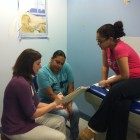Disparities
Study: Pediatricians Could Help Identify Mental Health Illnesses In Moms
|
Pediatricians can be a vital asset to new mothers when it comes to identifying mental health problems and connecting them to treatment, according to a new report. As many as one in five new mothers experience mental health challenges that impact their ability to care for their children, according to a report released this week by the Child Health and Development Institute (CHDI) of Connecticut. More of these instances would be diagnosed and treated if more pediatricians screened mothers at well-baby visits, the report states. Doing so represents a culture shift among pediatricians, said Lisa Honigfeld, CHDI vice president of health initiatives. “It’s a new way to look at child health services,” she said, but a worthwhile one.
